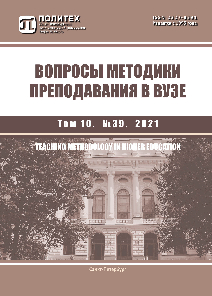Analysis of persuasive political mediatext as a method of building foreign language discursive competence of students
Building foreign language discursive competence of students with an average level of language proficiency is an important aspect of their professional development as students' analytical skills determine their relevance in the labor market. The primary task of a foreign language teacher for such students is the need to adapt discourse analysis. A simplified analysis of political discourse is considered, with the farewell speech of American President Barack Obama given as an example. Discourse analysis consists of the stages of reading and translation, explication of the extralinguistic background and stylistic analysis, which is most indicative for understanding the persuasive impact of discourse on listeners. The components of persuasiveness are politically significant content, the figurative structure of discourse, which uses metaphors and vivid epithets, as well as various rhetorical figures, enumerations, lexical repetitions, etc. The practical significance of the research is determined by the fact that this work can be used as the basis for a special course on discourse as a way of communicating and understanding the world around us. Research materials can be also considered as the basis for a teaching manual to be used not only in the educational process of colleges and universities, but also in the training of specialists in various fields.



